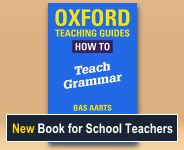Topic: Projects
Activities which can be used across several days, and developed through discussion in class. Some of these might be suitable for the A-level English Language NEA (non-exam assessment), where students have to conduct a linguistic investigation.
Englicious contains many resources for English language in schools, but the vast majority of them require you to register and log in first. For more information, see What is Englicious?

